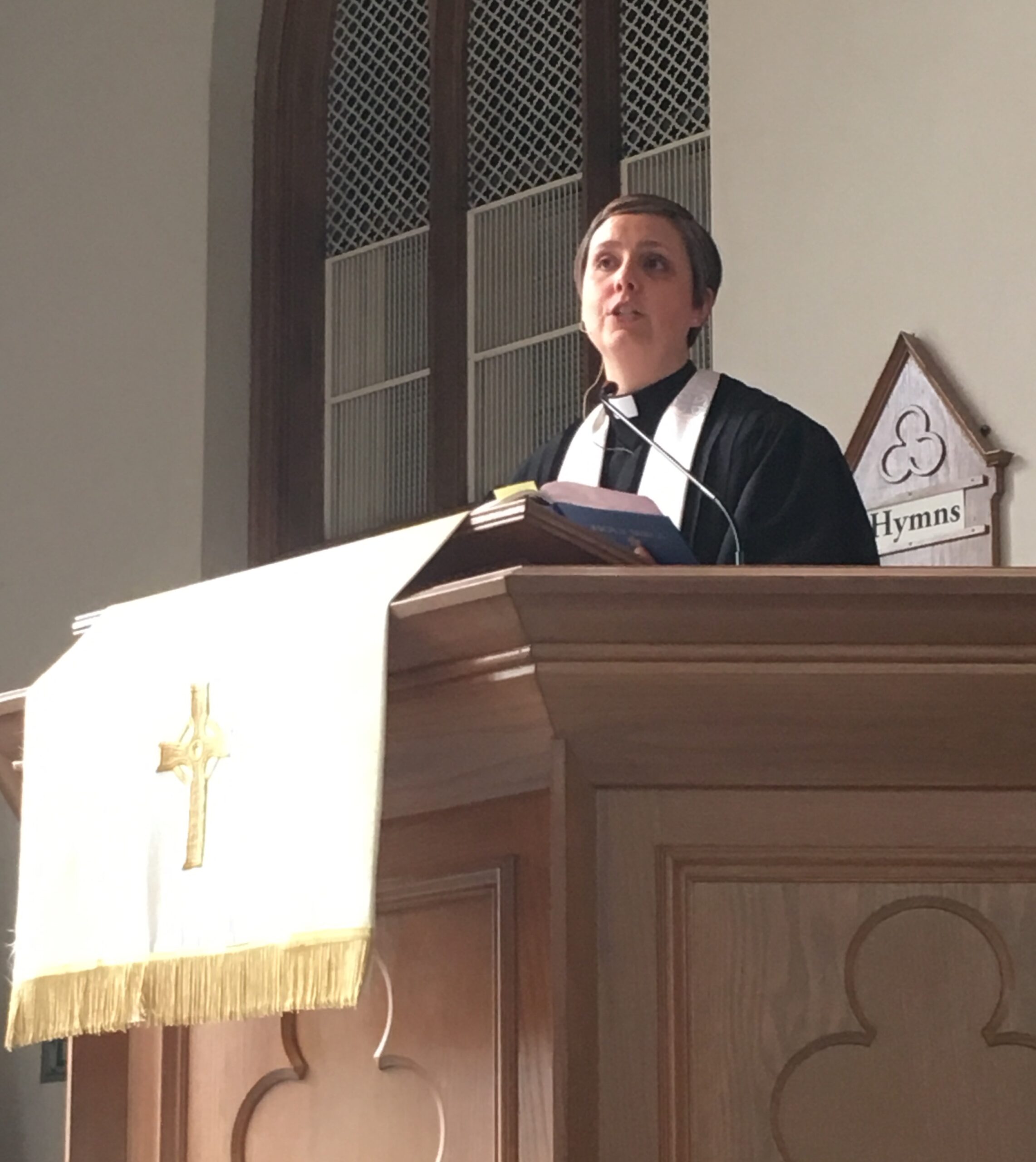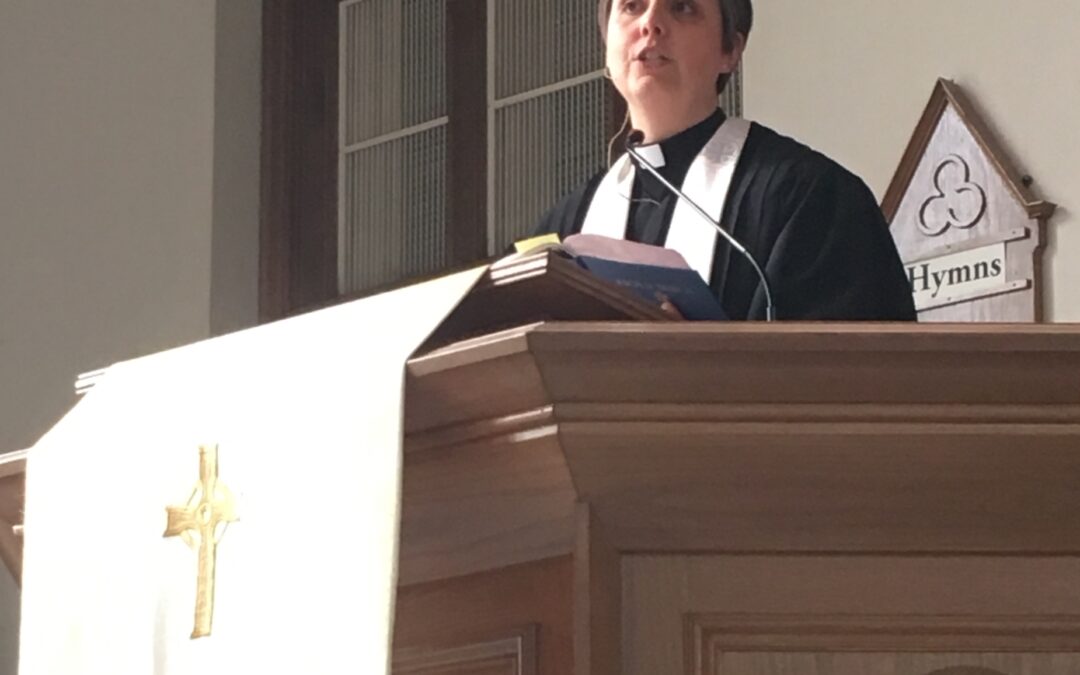 I read somewhere this week that Martin Luther once said sometimes you have to squeeze the biblical passage until it leaks the gospel. Well, I’ve been squeezing this passage and I believe God’s grace just might leak out of it. The stories we find in Scripture can be really hard even when they’re the words of Jesus. The Jesus we encounter in scripture was a gifted storyteller and teacher. Perhaps he knew that we’d need to be shocked into paying attention sometimes. Perhaps he knew that hard words or harsh words might convince us to take his words seriously. In some cases, perhaps with today’s Gospel reading, we need to have our own hard-headedness and sinfulness pointed out to us. What we call the parable of the wicked tenants or the parable of the greedy farmhands or perhaps even the parable of a long-suffering God is a difficult one. It has been misinterpreted. It has been misused. After all, it’s a very human tendency to try to twist scripture into something that justifies our own way of thinking. And so we treat this difficult story with care and we ask God to shine some light on it and help us understand. It is, indeed, the Word of the Lord.
I read somewhere this week that Martin Luther once said sometimes you have to squeeze the biblical passage until it leaks the gospel. Well, I’ve been squeezing this passage and I believe God’s grace just might leak out of it. The stories we find in Scripture can be really hard even when they’re the words of Jesus. The Jesus we encounter in scripture was a gifted storyteller and teacher. Perhaps he knew that we’d need to be shocked into paying attention sometimes. Perhaps he knew that hard words or harsh words might convince us to take his words seriously. In some cases, perhaps with today’s Gospel reading, we need to have our own hard-headedness and sinfulness pointed out to us. What we call the parable of the wicked tenants or the parable of the greedy farmhands or perhaps even the parable of a long-suffering God is a difficult one. It has been misinterpreted. It has been misused. After all, it’s a very human tendency to try to twist scripture into something that justifies our own way of thinking. And so we treat this difficult story with care and we ask God to shine some light on it and help us understand. It is, indeed, the Word of the Lord.
[READ Matthew 21:33-46]
I’m not sure we like to be reminded of what we’re capable of, as human beings, when we’re left to our own devices. I’m not sure we like to be reminded of our tendencies toward greed and entitlement and exploitation. So, our parable today doesn’t sit well because it reminds us of such things. How do we think of ourselves in light of this story? Not what does the story mean but how does it mean? How might it transform our thinking and our lives? Like the tenants in the story, what we have does not really belong to us. Our lives don’t really belong to us. Our bodies don’t really belong to us. Our planet doesn’t really belong to us. Our church doesn’t really belong to us. Our resources and what we earn don’t really belong to us. These things have been given to us, gifted to us, created by God for us.
And we are called to be good stewards of what we have been given. Stewards of our lives, our bodies, this planet, this church, and our resources and what we earn. We’ve been given a great deal of responsibility. What is a steward? One who cares for something on behalf of someone else. God has entrusted the care of creation to us, the care of our lives and our bodies, the care of this church, and of our resources. It’s a great deal of responsibility. As Jesus following, believing type people, we are called to produce good fruit, the scriptures tell us. We are called to live responsibly in a way that honors God and others at all times. We’ve got a good thing going much like the tenants. We’ve been set up well with all that we could ever need to produce good fruit. The vineyard has been planted, the fence constructed, the wine press set up and even a watchtower built.
We don’t always produce good fruit, though. We don’t always act responsibly in ways that honor God and others. We hoard God’s blessings and refuse to share. We exploit creation for our own convenience and personal gain. We use other people to get ahead. We participate in unjust systems that oppress. We consume and consume and consume without thought of consequence. We become entitled and ungrateful. That seems to be what happened here in this vineyard. The tenants had a good thing going and they exploited their situation. They felt they were owed more than what they were given. With the landowner far away, they didn’t seem to give the landowner much thought until it was time to present their offering. And when that time came they didn’t want to give anything at all. In their eyes, the vineyard and the fruit they produced belonged to them. So, they did what they felt they had to do to keep what was theirs. We do that, too. Perhaps we don’t beat and kill and stone, perhaps we just burn bridges and break relationships, overlook those in need and cling tightly to our treasures. Whatever it looks like, we do what feel we have to do to keep what we believe is ours.
It happens when we don’t give much thought to God’s involvement in our lives. It happens when we forget that what we have doesn’t belong to us at all but is pure gift. It happens when we don’t practice gratitude. And the consequence is that we miss out. We miss out on a relationship with God. We miss out on God’s kingdom. We don’t get to participate in God’s redemptive work. It’s a break in the relationship. It’s the natural consequence of sin. “God’s kingdom will be taken back from you and handed over to a people that will live out a kingdom life.” (21:43, The Message) Those who were listening Jesus’ story thought the appropriate punishment for the greedy tenants was death throw em out and see that they die a miserable death, retribution and revenge is the answer but Jesus says, no, the punishment will be of their own making…they’ll miss out. They won’t get to take are of the land anymore. It’s the natural consequence for their greed.
There is something crazy about this tale. The behavior of the tenants is crazy. Who were they to think they would inherit the land? Particularly in the way they went about gaining that inheritance through violence and exploitation and wicked means. How exactly was that supposed to work? It’s crazy. But I’m not sure anyone in the story is crazier than the landowner. After the treatment the first servants received why did he send more? After the treatment the second servants received why did he send his own son? It doesn’t make sense and it certainly isn’t rational. The tenants were given chance after chance after chance to do what was right. They were given chance after chance after chance to be good stewards, to give what they ought, and to show gratitude to the landowner. How foolish of the landowner to give so many chances. How foolish of the tenants to waste them.
The grace that we are offered time and again, the love of God which pursues us relentlessly, could be considered a foolish thing, too. There is an absurdity to the number of chances God gives to us. We turn away. We make poor choices. We squander God’s good gifts. And yet, time and again God extends to us a reconciling hand. God gives us chance after chance after chance. For it is up to us, you see, to receive that grace and that love which has been offered and to live in response to it. To reject it, I think, would be the most foolish thing of all. I believe the key here is gratitude. I believe the remedy for our greed and our entitlement and our poor stewardship is thanks. Because we cannot lie or cheat or steal our way into the inheritance which God has for us. And when we are greedy about the gifts we’ve been given, when we hoard God’s blessings we miss out on all that God has for us. We miss out on what God is doing in the world. We miss out on the transformation of our lives. We miss out on a relationship with our Creator.
God will pursue us. God will come back time and again. We know this because God has done it. God, who sent his son in order that we should live. The proper response to this astonishing truth is gratitude. When we are grateful for the gifts of God, we are generous with those gifts. When we are grateful for the gifts of God, we produce good fruit for the kingdom. When we live in a posture of gratitude, we are open and receptive to God’s redeeming work in this world. When we live in a posture of gratitude, it is impossible to be greedy. When we give thanks to our Creator and seek a right relationship with him, our lives take a different shape. Our lives are no longer lived for ourselves alone but for God and for others. It’s the natural consequence of gratitude and grace.
I’d like to close with a Sabbath blessing from Young Clergy Women International:
Blessings
Poured out
Each and every day
May we stop And take notice And name And proclaim The blessings We have Received
And
Help others
Do the same
Not
At the expense
Of sorrow
Anger
Grief
Suffering
But instead
Naming
The endless
Complications
Of this life
That it is
Not so easy
To separate
Deep pain
From
Deep joy
Let us
Embrace
All that comes
Our way
So that we may
Face each
With love
Learn to
Distinguish
To discern
Which to hold onto
Which to let go
Which to sit with
Which to transform
For nothing
Can separate us
From the love
Of the One
Who brought us
Into being
Remains with us
Forgives us
Nudges us
Calls us
Pushes us
Shows us
A new way
Each day.
Amen.
Rev. Alex Rodgers
Decatur Presbyterian Church
Decatur, GA
July 23, 2017


